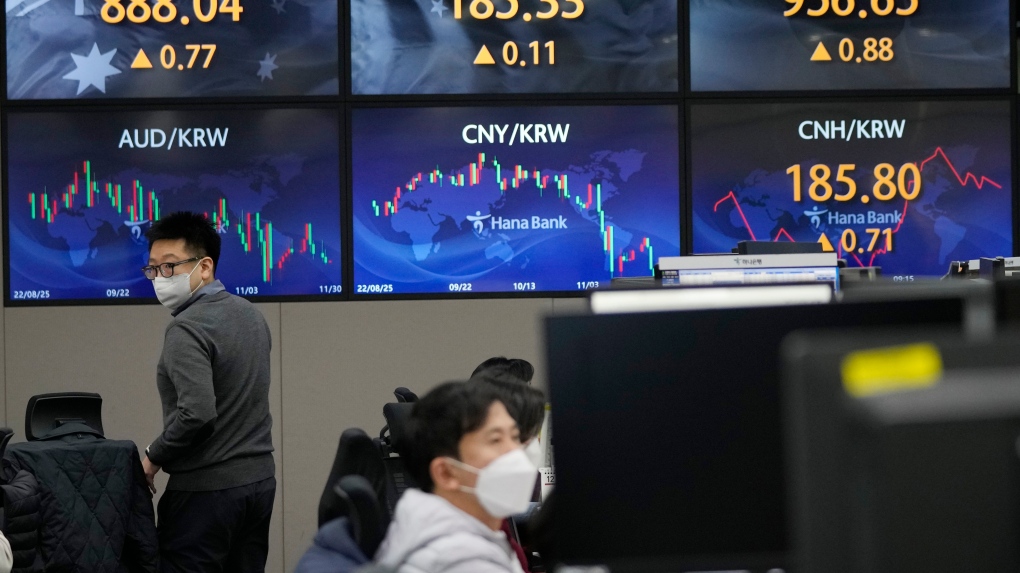
B.C. tenants evicted for landlord's use after refusing large rent increase to take over neighbouring suite
Ashley Dickey and her mother rented part of the same Coquitlam duplex in three different decades under three different landlords.
Canada's main stock index was down in late-morning trading, weighed down by losses in the industrial and telecommunication sectors, while U.S. stock markets also fell.
The S&P/TSX composite index was down 39.21 points at 20,486.24.
In New York, the Dow Jones industrial average was down 178.05 points at 34,216.96. The S&P 500 index was down 31.48 points at 4,045.09, while the Nasdaq composite was down 117.59 points at 11,364.86.
The Canadian dollar traded for 74.20 cents US compared with 74.44 cents US on Thursday.
The January crude oil contract was up 14 cents at US$81.36 per barrel and the January natural gas contract was down 14 cents at US$6.60 per mmBTU.
The February gold contract was down US$14.70 at US$1,800.50 an ounce and the March copper contract was down less than a penny at US$3.82 a pound.
This report by The Canadian Press was first published Dec. 2, 2022

Ashley Dickey and her mother rented part of the same Coquitlam duplex in three different decades under three different landlords.
A man who fell into a crevasse while leading a backcountry ski group deep in the Canadian Rockies has died.
A new survey by Dalhousie University's Agri-Food Analytics Lab asked Canadians about their food consumption habits amid rising prices.
MPP Sarah Jama was asked to leave the Legislative Assembly of Ontario by House Speaker Ted Arnott on Thursday for wearing a keffiyeh, a garment which has been banned at Queen’s Park.
Charlie Woods failed to advance in a U.S. Open local qualifying event Thursday, shooting a 9-over 81 at Legacy Golf & Tennis Club.
As Donald Trump was running for president in 2016, his old friend at the National Enquirer was scooping up potentially damaging stories about the candidate and paying out tens of thousands of dollars to keep them from the public eye.
After Prime Minister Justin Trudeau said the federal government would still send Canada Carbon Rebate cheques to Saskatchewan residents, despite Saskatchewan Premier Scott Moe's decision to stop collecting the carbon tax on natural gas or home heating, questions were raised about whether other provinces would follow suit. CTV News reached out across the country and here's what we found out.
A Montreal actress, who has previously detailed incidents she had with disgraced Hollywood producer Harvey Weinstein, says a New York Court of Appeals decision overturning his 2020 rape conviction is 'discouraging' but not surprising.
Caleb Williams is heading to the Windy City, aiming to become the franchise quarterback Chicago has sought for decades.

Mounties in Nanaimo, B.C., say two late-night revellers are lucky their allegedly drunken antics weren't reported to police after security cameras captured the men trying to steal a heavy sign from a downtown business.
A property tax bill is perplexing a small townhouse community in Fergus, Ont.
When identical twin sisters Kim and Michelle Krezonoski were invited to compete against some of the world’s most elite female runners at last week’s Boston Marathon, they were in disbelief.
The giant stone statues guarding the Lions Gate Bridge have been dressed in custom Vancouver Canucks jerseys as the NHL playoffs get underway.
A local Oilers fan is hoping to see his team cut through the postseason, so he can cut his hair.
A family from Laval, Que. is looking for answers... and their father's body. He died on vacation in Cuba and authorities sent someone else's body back to Canada.
A former educational assistant is calling attention to the rising violence in Alberta's classrooms.
The federal government says its plan to increase taxes on capital gains is aimed at wealthy Canadians to achieve “tax fairness.”
At 6'8" and 350 pounds, there is nothing typical about UBC offensive lineman Giovanni Manu, who was born in Tonga and went to high school in Pitt Meadows.
 A currency trader passes by the screens showing the foreign exchange rates at the foreign exchange dealing room of the KEB Hana Bank headquarters in Seoul, South Korea, Wednesday, Nov. 30, 2022. (AP Photo/Ahn Young-joon)
A currency trader passes by the screens showing the foreign exchange rates at the foreign exchange dealing room of the KEB Hana Bank headquarters in Seoul, South Korea, Wednesday, Nov. 30, 2022. (AP Photo/Ahn Young-joon)